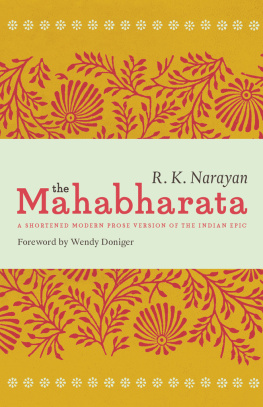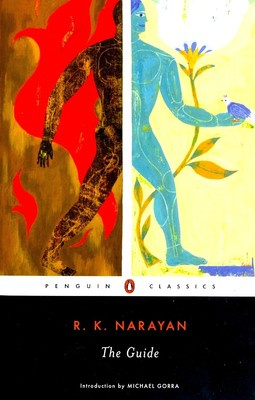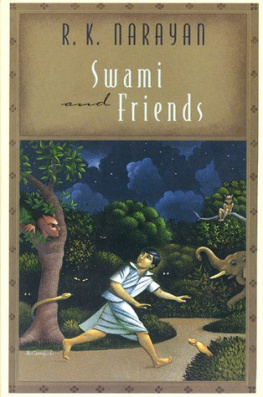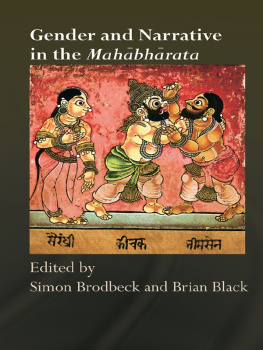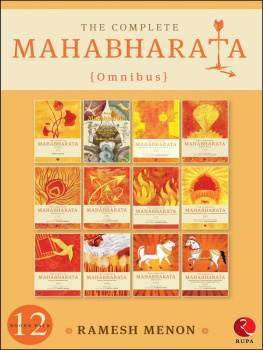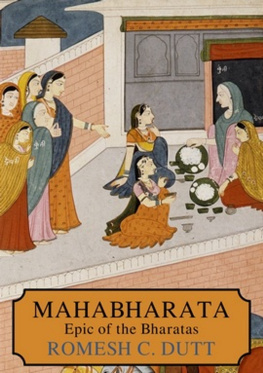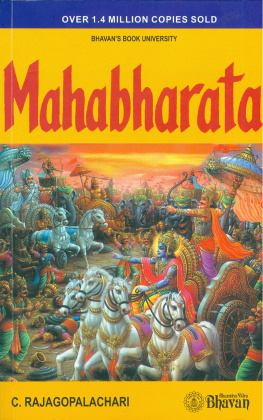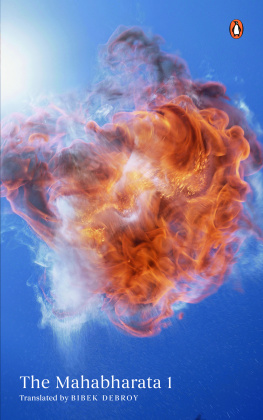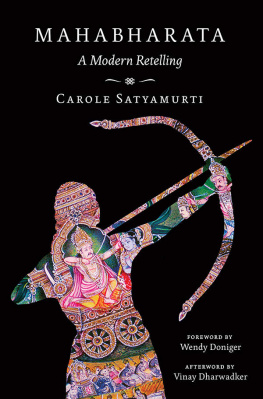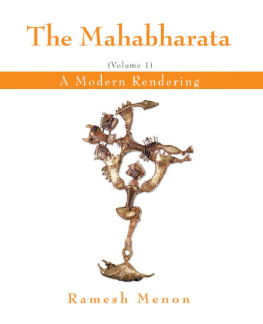Also by R. K. Narayan
NOVELS OF MALGUDI
Swami and Friends
The Bachelor of Arts
The Dark Room
The English Teacher
Mr SampathThe Printer of Malgudi
The Financial Expert
Waiting for the Mahatma
The Guide
The Man-Eater of Malgudi
The Vendor of Sweets
The Painter of Signs
A Tiger for Malgudi
Malgudi Days
Talkative Man
The Ramayana
The Mahabharata
The World of Nagaraj
STORIES
A Horse and Two Goats
An Astrologers Day and Other Stories
Lawley Road
Under the Banyan Tree and Other Stories
The Grandmothers Tale and Selected Stories
MEMOIRS
My Days
TRAVEL
My Dateless Diary
The Emerald Route
ESSAYS
Next Sunday
Reluctant Guru
The Mahabharata
A Shortened Modern Prose Version of the Indian Epic
R. K. Narayan
Foreword by Wendy Doniger
WITH DECORATIONS BY R. K. LAXMAN
THE UNIVERSITY OF CHICAGO PRESS
Chicago & London
R. K. NARAYAN (19062001) was one of the most prominent Indian novelists of the twentieth century. His works include Mr. SampathThe Printer of Malgudi, Swami and Friends, Waiting for Mahatma, and Gods, Demons, and Others, all published by the University of Chicago Press.
WENDY DONIGER is an American Indologist and the Mircea Eliade Distinguished Service Professor of the History of Religions in the Divinity School of the University of Chicago. She is the author of more than thirty books.
The University of Chicago Press, Chicago 60637
The University of Chicago Press, Ltd., London
1978 by R. K. Narayan
Foreword 2013 by the University of Chicago
All rights reserved. Originally published 1978 by the Viking Press.
University of Chicago Press edition 2000 and 2013
Printed in the United States of America
22 21 20 19 18 17 16 15 14 13 1 2 3 4 5
ISBN-13: 978-0-226-05165-9 (paper)
ISBN-13: 978-0-226-05747-7 (e-book)
DOI: 10.7208/chicago/9780226057477.001.001
Library of Congress Cataloging-in-Publication Data
Narayan, R. K., 19062001.
The Mahabharata : a shortened modern prose version of the Indian epic / R. K. Narayan ; foreword by Wendy Doniger.
pages. cm.
ISBN 978-0-226-05165-9 (pbk. : alk. paper) ISBN 978-0-226-05747-7 (e-book)
1. Hindu mythologyFiction. 2. Hindu godsFiction. 3. MahabharataAdaptations. I. Doniger, Wendy. II. Title.
PR9499.3.N3M3 2013
823'.912dc23
2013005614
This paper meets the requirements of ANSI/NISO Z39.48-1992 (Permanence of Paper).
CONTENTS
by Wendy Doniger
FOREWORD
Poets have told it before, and are telling it now, and will tell it.... What is here, about piety, profit, and pleasure, is found elsewhere, but what is not here is nowhere else.
Mahabharata (1.1.23 and 1.56.33)
T HUS THE MAHABHARATA DESCRIBES itself as unlimited in both time and space. Its enormous scope poses two big problems that anyone who tries to translate the Mahabharata must confront: choosing the parts to translate, and finding the words to convey the unique spirit of the text. R. K. Narayan succeeds in solving both of these better than any of the dozens of writers who have dared to take on the task.
As for the choice, the Mahabharata is not only dauntingly large, as Narayan points out in his own excellent introduction to the first edition of this volume; it also refuses to stand still long enough for anyone to take an accurate picture of it. Although the text was preserved both orally and in manuscript, it is so extremely fluid that there is no single Mahabharata; there are hundreds of Mahabharatashundreds of different manuscripts and innumerable oral versions. A. K. Ramanujan once remarked that no Indian ever hears the Mahabharata for the first time; others have described it as a work in progress or a living library that does not belong in a book. There is a soi-disant critical edition of the Mahabharata, with an apparatus of interpolations longer than the text itself, but that edition has not been able to defend its claim to sit alone on the throne of the urtext. (For instance, the story of the poet Vyasa dictating the Mahabharata to the god Ganesha, which everyone who knows anything about the Mahabharata knows is a part of it, did not pass the manuscript muster of the critical edition; Narayan tells this story in his introduction, but not in the text.)
The Mahabharata flits back and forth between Sanskrit manuscripts and village storytellers, each adding new bits to the old story, constantly reinterpreting it. Narayan is therefore just doing, and doing very well, what others have done for centuriesselecting certain parts of the great text to retell in his own words. One of the fault lines along which others have made such a selection is between the basic linear plot (the tale of the five heroes, the Pandava brothers, and the great war that they fight against their cousins) and the nonlinear blocks of mythology and philosophy that constitute a major part of the Mahabharata. Earlier European scholars regarded these parts of the text as irrelevant interpolations, presumably made by devout Brahmins who didnt mind spoiling a good secular story with their pedantic and self-serving religious rants. But none of this is true: the plot is not secular, to begin with, as the gods are caught up with it at every moment; nor are the myths and philosophical arguments extraneous to it. Indeed, for a Hindu reader (or listener), the myths and debates (including such things as the Bhagavad Gita) are the heart of the matter, framed and illustrated by the plot; as Narayan puts it, In a sense, these could be termed asides, but no reader of The Mahabharata would miss any part of it. To cut these asides would be like cutting all the arias out of a Verdi opera to make it easier to follow the action of the plot. Narayan brilliantly integrates all the levels of the text, constantly enriching the central plot with an awareness of its mythological and philosophical resonances. Right at the beginning, he tells the tangled tale of the ancestry of the heroes by concentrating on the supernatural intervention of the river Ganges and the subsequent employment of gods as biological parents of the sons of the impotent king Panduthe five legitimate Pandavas and the illegitimate Karna, the dark, tragic figure of the Mahabharata.
Narayan claims to be translating the Sanskrit version of the text, and for the most part he does, though he spells the names of some characters as they would have been familiar to him from his Tamil-speaking childhood rather than from the Sanskrit text (Kunthi instead of Kunti, Satyavathi for Satyavati, etc.). But occasionally he reworks the Sanskrit version of a story in ways that reflect the uneasiness of the later tradition, its inability, or unwillingness, to deal with some of the less admirable attitudes of the ancient text. For instance, there is an episode in which the enemies of the Pandavas plan to kill them (and their mother) by trapping them all in a highly flammable house and setting fire to it; the Pandavas, learning of this plot in advance, dig a tunnel through which they will escape when the fire is set. In the Sanskrit text, they invite a low-caste tribal woman and her five sons to the house, get them drunk, and leave them there when they set the fire and escape through the tunnel, so that their enemies find the six corpses and think that the Pandavas have perished in the fire. The total indifference to the fate of the low-caste tribals on the part of the Pandavasand, indeed, on the part of the narrator of the texthas become, in recent years, a point of embarrassment to contemporary Hindus sensitive to the injustices of the caste system. In Narayans retelling, the only person the Pandavas purposely trap in the house is the wicked architect who designed it to kill them; yet afterward people think the Pandavas perished because the charred remains of a woman and her five sons had been discovered, and we never learn anything more about how those six people got there. Here, and elsewhere, Narayan nimbly sidesteps some of the more controversial social issues.
Next page
